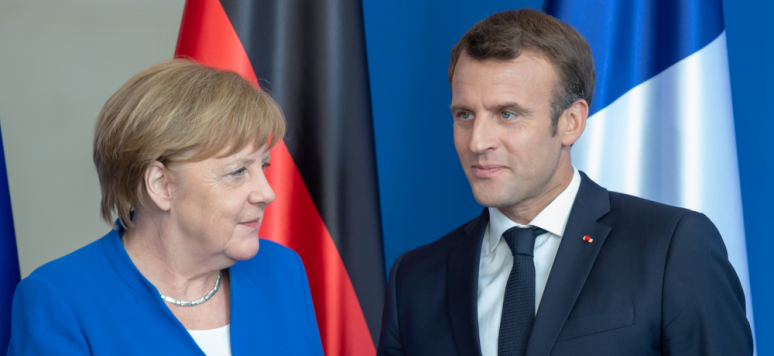L'Ifri dans les médias - France prepares for Departure of Sometimes Reluctant Partner and Rival Merkel

Macron set to become the uncontested leader of Europe with German chancellor’s exit. Chancellor Angela Merkel was not naturally inclined to focus on Franco-German relations. “She comes from the former East Germany, and her experience was of east bloc countries, especially Russia, ” says Sabine Rau, Paris bureau chief for the German public television network WRD.
“Merkel sees politics in terms of issues and efficiency, not personal relationships,” Rau continues. She was baffled by Jacques Chirac’s hand-kissing, annoyed by Sarkozy’s aggressiveness. She may have felt intimidated by the legacy of historic friendships between past leaders: Konrad Adenauer and Charles de Gaulle; Helmet Kohl and François Mitterrand; Chirac and Gerhard Schroeder.
- These two events, instigated by French presidents, were Merkel’s finest hours, says Eric-André Martin, head of the The Study Committee on Franco-German Relations (Cerfa) at The French Institute for International Relations (Ifri): “In 2008-2010, as in 2020, the French and German leaders worked together to avoid major political and economic crises in Europe.”
[...]
- Eric-André Martin calls Franco-German relations “a permanent compromise”. They agree on long-term objectives, and the fact that only the European Union (EU) can solve big problems, he says. “But they differ on the means of getting there.”
[...]
-
“The Germans thought Macron was going too far, that he was over ambitious and did not give sufficient consideration to the US position,” says Paul Maurice, a research fellow at The Study Committee on Franco-German Relations (Cerfa) at Ifri. “Macron’s statement in the autumn of 2019 that Nato was ‘brain dead’ was also ill-received in Germany, because it was seen as a desire to cut Europe’s ties with Nato.”
Germany has long enjoyed special status as a US ally. Maurice suggests the French may have been a little jealous that Merkel was invited to Washington before Macron by president Joe Biden.
Armin Laschet, the president of North Rhine-Westphalia, the most populous region in Germany, is likely to succeed Merkel as chancellor.
“Laschet had a Belgian grandfather. He is a Rhineland Catholic, the kind of pro-European German whom the French have always known,” says Maurice. “In his interviews, Laschet praises Macron’s European policies.”
[...]
This article is available on the website of The Irish Times "France prepares for departure of sometimes reluctant partner and rival Merkel [1]".
